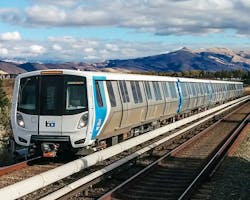Deprivation and Fascination
Transportation, housing and food are the three legs of the stool of civilization, said keynote speaker Sam Singer, president, Singer Associates Inc., so transit agencies should be aggressive in telling their story.
Singer shared how deprivation and fascination are the messages that really resonate with people.
“Always be thinking about the other person. What is in it for them? What do you provide for their lives? Make it better, make it easier,” Singer said. “What would happen if I didn’t have it?”
People take transit for granted and there’s a lot that is needed to keep it moving. Singer said, “The more visual things you give them, the more date you give them, the better.”
Local Lessons
Something as seemingly mundane as the cleaning process provided some of that fascination Singer spoke of. Bay Area Rapid Transit has faced the challenge of homelessness in the stations, cleanliness of the stations and people thinking BART didn’t clean.
BART General Manager Grace Crunican said she would talk with people on the platforms and hear about the cleanliness concerns from riders. “When I tell people what we’re doing, they’re stunned,” she said. “They didn’t know we knew we had a problem and we were trying to solve it.”
To help remedy that, BART created a video showing all that they do, to clean the system every day.
In November 2016, residents in the three-county Bay Area Rapid Transit district passed Measure RR with more than 70 percent of the vote. The overwhelming voter support for that $3.5 billion bond was because of communication, said Crunican.
BART’s cars are an average of 40 years old, and Crunican joked they have the “great, Soviet-style architecture,” but said they are turning themselves around. Using the money from Measure RR, they are investing in tunnels, the power system and other things that aren’t seen as “sexy.”
There are 10 new cars on the system as of January 19. The Fleet of the Future cars feature a wide spectrum of improvements to make them quieter, cooler, more comfortable and easier to clean.
Crunican said it’s through communications and marketing that they make themselves a necessary part of the region. “We made the word BARTable to make ourselves an essential part of their day,” she said.
Edward Reiskin, director of Transportation, San Francisco Municipal Transportation Agency, talked of the changes we’re seeing in how people move in our cities and that while it’s a tremendous challenge, there is also tremendous opportunity. “That’s why the work you do, is so incredibly important,” he said. “for us as an industry to articulate, inform and educate the general public about what we do.
“The work you all do is incredibly important for us to do our job, to move hundreds of thousands of people who move here every day in the Bay Area,” said Reiskin.
Moving the Industry Forward
Nathaniel Ford Sr., chair, APTA and chief executive officer, Jacksonville Transportation Authority, said our primary mission is advocacy so people are supportive of transit, whether they use it or not.
Ford laid out the five priorities as APTA chair, including adjusting to the new mobility paradigm, developing the workforce of the future, utilizing the full potential of big data, mitigating enterprise risk, and leadership and advocacy.
“We’ve got to work together,” said Ford. “It’s time for us to pull together as it relates to public transportation and move our good work forward.”
APTA President and CEO Paul Skoutelas said a day doesn’t go by that he doesn’t talk to the marketing and communciations folks as they are the people that have a pulse on what’s happening.
“You have a tremendous amount of responsibility,” he said. “You carry an extraordinary amount of responsibility to make sure the messaging is done right and we’re telling our story.”
